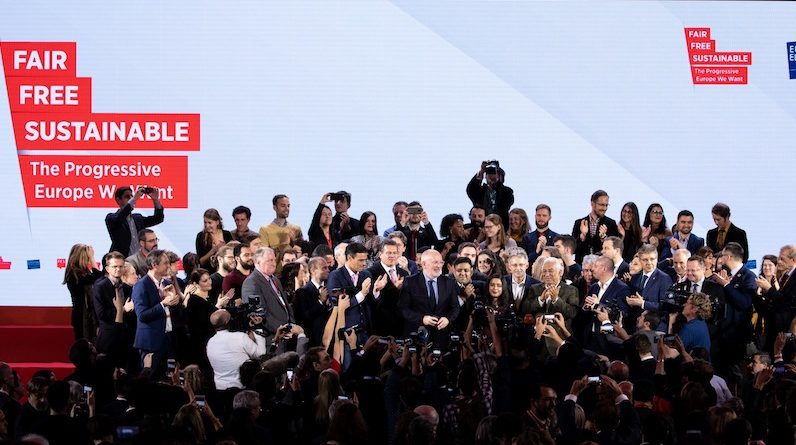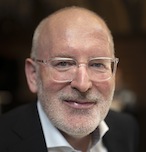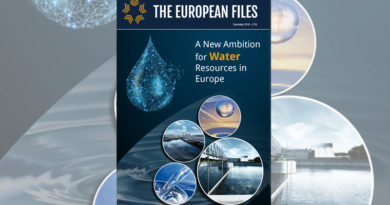
A new social contract for Europe
Interview by Hughes Belin
Q: After Brexit, what is the future of Europe? Where is the EU headed?
A: I find the 2016 referendum and Brexit so unspeakably sad. I respect the vote of the British people, it’s their sovereign choice and a possibility offered by the treaties of the European Union. But the last few years have really show how difficult it is to untangle fifty years of close cooperation.
These elections will be about the future of Europe and the soul of Europe, about standing firm against a right-wing backlash based on nostalgia and reactionary politics. I’m standing for a Europe based on values, to give voice to those who want cooperation not confrontation.
The EU has given us all an unparalleled period of peace. It has brought together a continent that was so divided only 30 years ago. But it is also more than that, it is about facing the future as part of a community that is much bigger than the national community. When you appreciate the magnitude of the challenges facing us with climate change, or international trade, or the seriousness of the migration challenge. Then there is only one thing we can do as Europeans: work together to chart a positive course. This is the only way forward.
Q: What flagship measures do you propose at European level in the framework of your “new social contract for Europe”?
A: Rewriting the social contract means creating a sustainable, democratic and fair Europe, and doing it quickly. A big part of a fairer society is an equal society, for men and women. I am a convinced feminist. I’ve been saying it for many years now. We need to defend women’s rights now, we need more feminists, male and female.
I’m going to put this principle at the heart of the Commission I lead. It’s time we closed the gender pay gap and pension gap. It’s time women and men have the same work-life balance. It’s time to put an end to gender-based violence and sexual harassment. That’s why my Commission will implement a binding EU Gender Equality Strategy, to finally make this a reality. By the end of my mandate, I want the gender pay gap to be gone, to be zero.
Another key issue for me, and wherever I go in Europe people raise this with me, is housing. Young people say we can’t afford to live in our cities, or we need to live with our parents, because everything is so expensive. And then there’s the sustainability issue, we need all houses to be more energy efficient.
So why not make more European structural funds available to regional governments to address this specific issue. We should be telling local government, if you have plans for housing and you ensure a certain proportion are affordable housing and are energy efficient, you will get support from Europe. That way we can address the housing need. We can prove to people that Europe can make a positive dif- ference to their lives.
And then there’s all the changes around work and the new models of employment that have sprung up because of Deliveroo, and Uber, and other companies. I want people to have steady jobs, not zero hours contracts. People who work in these types of jobs aren’t ‘entrepreneurs’, they are workers who deserve rights and protections like everyone else. They shouldn’t be left at the mercy of the market when they can’t work because they fall off their bike delivering food, or become ill.
Q: What is your industrial strategy for Europe? How will you give European industry a future?
A: We need to make sure that we don’t deplete the resources of the world, and instead we reuse them, that we go to a circular economy, an economic system which minimises waste and makes the most of resources. This is where Europe’s future lies. And this is urgent. The longer you wait, the more difficult it’s going to be, the more costly it’s going to be.
But how we approach this is vital. If you go up to a person and you talk to them about Europe’s industry and the green economy and the end of the world, they will not be receptive when their only worry is how they get to the end of the month, whether they have enough money to provide for their family or not.
So, if you want this circular economy to be a project that can be embraced by many people in society, we need to make sure that social sustainability is front and centre. We want to start the move to a greener Europe to come with a guarantee of social sustainability, because we will not get the European population behind sustainability if they don’t see that we also support Europe’s industry and workers.
Q: How do you propose to take forward environmental protection and EU leadership on climate change?
A: Climate change is urgent. Never let anybody tell you that changing our society into a sustainable society is a luxury, it’s essential. People live where they live, and we should guarantee that they can live there without becoming sick because of bad quality air, or water, or the environment more generally. My commission will raise the EU’s climate ambitions, protecting biodiversity and cutting pollution. Our work to eliminate single use plastics is just one example of how we do this.
Q: How do you see the EU’s relationships with big trading partners such as the USA, Russia and China evolving?
A: Look at the challenge coming out of America and Russia. Look at how China is continuously trying to gain the upper hand in trade and in so many other areas. And if you just think about the size of the test facing us with climate change, and the seriousness of the migration challenge. Then, there is only one route through it: we need to work together as Europeans to come up with a plan to meet all these challenges. When we speak with one voice we stand on an equal footing with the USA, Russia and China, and we can use our trading relationship to make sure our world economy is more sustainable ecologically, and more progressive when it comes to standards and workers’ rights. Europe can be a benchmark for social justice, dialogue, multilateralism, human rights, decent work, the rule of law, sustainability development, gender equality, and so much more, but only if we Europeans stick together.
Q: How can the EU institutions best be adapted to fulfil your programme?
A: As Commission President, I would put the Sustainable Development Goals at the core of my work programme, and task each of my Commissioners with delivering on specific Goals. It is important that the EU institutions work well so we can tackle poverty, inequality, environmental degradation, and promote sustainability, prosperity, peace and justice. I think it is really a matter of setting the right direction for the EU and concentrating our efforts on delivering a more fair, free and sustainable Europe for all.




